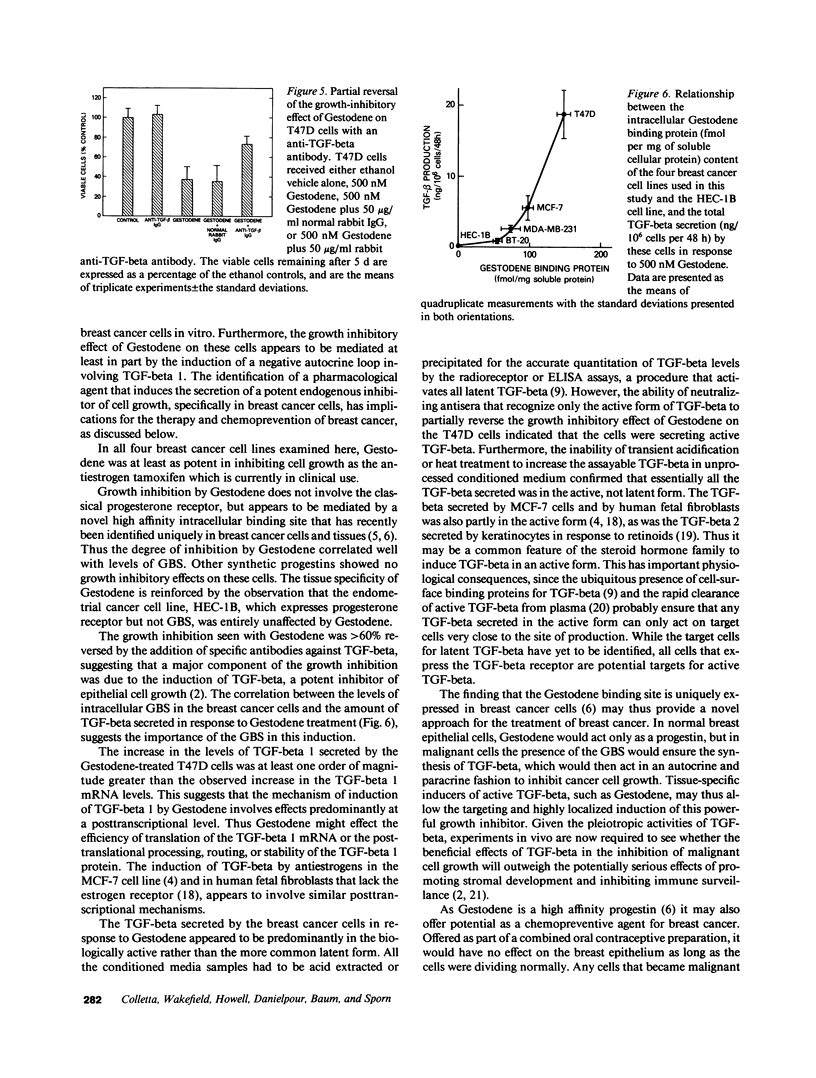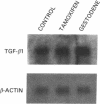Abstract
Recent experimental work has identified a novel intracellular binding site for the synthetic progestin, Gestodene, that appears to be uniquely expressed in human breast cancer cells. Gestodene is shown here to inhibit the growth of human breast cancer cells in a dose-dependent fashion, but has no effect on endocrine-responsive human endometrial cancer cells. Gestodene induced a 90-fold increase in the secretion of transforming growth factor-beta (TGF-beta) by T47D human breast cancer cells. Other synthetic progestins had no effect, indicating that this induction is mediated by the novel Gestodene binding site and not by the conventional progesterone receptor. Furthermore, in four breast cancer cell lines, the extent of induction of TGF-beta correlated with intracellular levels of Gestodene binding site. No induction of TGF-beta was observed with the endometrial cancer line, HECl-B, which lacks the Gestodene binding site, but which expresses high levels of progesterone receptor. The inhibition of growth of T47D cells by Gestodene is partly reversible by a polyclonal antiserum to TGF-beta. These data indicate that the growth-inhibitory action of Gestodene may be mediated in part by an autocrine induction of TGF-beta.
Full text
PDF






Images in this article
Selected References
These references are in PubMed. This may not be the complete list of references from this article.
- Berthois Y., Katzenellenbogen J. A., Katzenellenbogen B. S. Phenol red in tissue culture media is a weak estrogen: implications concerning the study of estrogen-responsive cells in culture. Proc Natl Acad Sci U S A. 1986 Apr;83(8):2496–2500. doi: 10.1073/pnas.83.8.2496. [DOI] [PMC free article] [PubMed] [Google Scholar]
- Colletta A. A., Howell F. V., Baum M. A novel binding site for a synthetic progestagen in breast cancer cells. J Steroid Biochem. 1989 Dec;33(6):1055–1061. doi: 10.1016/0022-4731(89)90409-3. [DOI] [PubMed] [Google Scholar]
- Colletta A. A., Wakefield L. M., Howell F. V., van Roozendaal K. E., Danielpour D., Ebbs S. R., Sporn M. B., Baum M. Anti-oestrogens induce the secretion of active transforming growth factor beta from human fetal fibroblasts. Br J Cancer. 1990 Sep;62(3):405–409. doi: 10.1038/bjc.1990.307. [DOI] [PMC free article] [PubMed] [Google Scholar]
- Danielpour D., Dart L. L., Flanders K. C., Roberts A. B., Sporn M. B. Immunodetection and quantitation of the two forms of transforming growth factor-beta (TGF-beta 1 and TGF-beta 2) secreted by cells in culture. J Cell Physiol. 1989 Jan;138(1):79–86. doi: 10.1002/jcp.1041380112. [DOI] [PubMed] [Google Scholar]
- Feinberg A. P., Vogelstein B. A technique for radiolabeling DNA restriction endonuclease fragments to high specific activity. Anal Biochem. 1983 Jul 1;132(1):6–13. doi: 10.1016/0003-2697(83)90418-9. [DOI] [PubMed] [Google Scholar]
- Hansen D., Altschmied L., Hillen W. Engineered Tet repressor mutants with single tryptophan residues as fluorescent probes. Solvent accessibilities of DNA and inducer binding sites and interaction with tetracycline. J Biol Chem. 1987 Oct 15;262(29):14030–14035. [PubMed] [Google Scholar]
- Horwitz K. B., Zava D. T., Thilagar A. K., Jensen E. M., McGuire W. L. Steroid receptor analyses of nine human breast cancer cell lines. Cancer Res. 1978 Aug;38(8):2434–2437. [PubMed] [Google Scholar]
- Iqbal M. J., Colletta A. A. Characterisation of gestodene binding to the oestrogen receptor in human malignant breast tissue. Anticancer Res. 1987 Jan-Feb;7(1):45–48. [PubMed] [Google Scholar]
- Jakowlew S. B., Dillard P. J., Sporn M. B., Roberts A. B. Complementary deoxyribonucleic acid cloning of a messenger ribonucleic acid encoding transforming growth factor beta 4 from chicken embryo chondrocytes. Mol Endocrinol. 1988 Dec;2(12):1186–1195. doi: 10.1210/mend-2-12-1186. [DOI] [PubMed] [Google Scholar]
- Kehrl J. H., Roberts A. B., Wakefield L. M., Jakowlew S., Sporn M. B., Fauci A. S. Transforming growth factor beta is an important immunomodulatory protein for human B lymphocytes. J Immunol. 1986 Dec 15;137(12):3855–3860. [PubMed] [Google Scholar]
- Knabbe C., Lippman M. E., Wakefield L. M., Flanders K. C., Kasid A., Derynck R., Dickson R. B. Evidence that transforming growth factor-beta is a hormonally regulated negative growth factor in human breast cancer cells. Cell. 1987 Feb 13;48(3):417–428. doi: 10.1016/0092-8674(87)90193-0. [DOI] [PubMed] [Google Scholar]
- Kondaiah P., Van Obberghen-Schilling E., Ludwig R. L., Dhar R., Sporn M. B., Roberts A. B. cDNA cloning of porcine transforming growth factor-beta 1 mRNAs. Evidence for alternate splicing and polyadenylation. J Biol Chem. 1988 Dec 5;263(34):18313–18317. [PubMed] [Google Scholar]
- Laemmli U. K. Cleavage of structural proteins during the assembly of the head of bacteriophage T4. Nature. 1970 Aug 15;227(5259):680–685. doi: 10.1038/227680a0. [DOI] [PubMed] [Google Scholar]
- Reddel R. R., Murphy L. C., Hall R. E., Sutherland R. L. Differential sensitivity of human breast cancer cell lines to the growth-inhibitory effects of tamoxifen. Cancer Res. 1985 Apr;45(4):1525–1531. [PubMed] [Google Scholar]
- Roberts A. B., Flanders K. C., Kondaiah P., Thompson N. L., Van Obberghen-Schilling E., Wakefield L., Rossi P., de Crombrugghe B., Heine U., Sporn M. B. Transforming growth factor beta: biochemistry and roles in embryogenesis, tissue repair and remodeling, and carcinogenesis. Recent Prog Horm Res. 1988;44:157–197. doi: 10.1016/b978-0-12-571144-9.50010-7. [DOI] [PubMed] [Google Scholar]
- Wakefield L. M., Smith D. M., Masui T., Harris C. C., Sporn M. B. Distribution and modulation of the cellular receptor for transforming growth factor-beta. J Cell Biol. 1987 Aug;105(2):965–975. doi: 10.1083/jcb.105.2.965. [DOI] [PMC free article] [PubMed] [Google Scholar]





